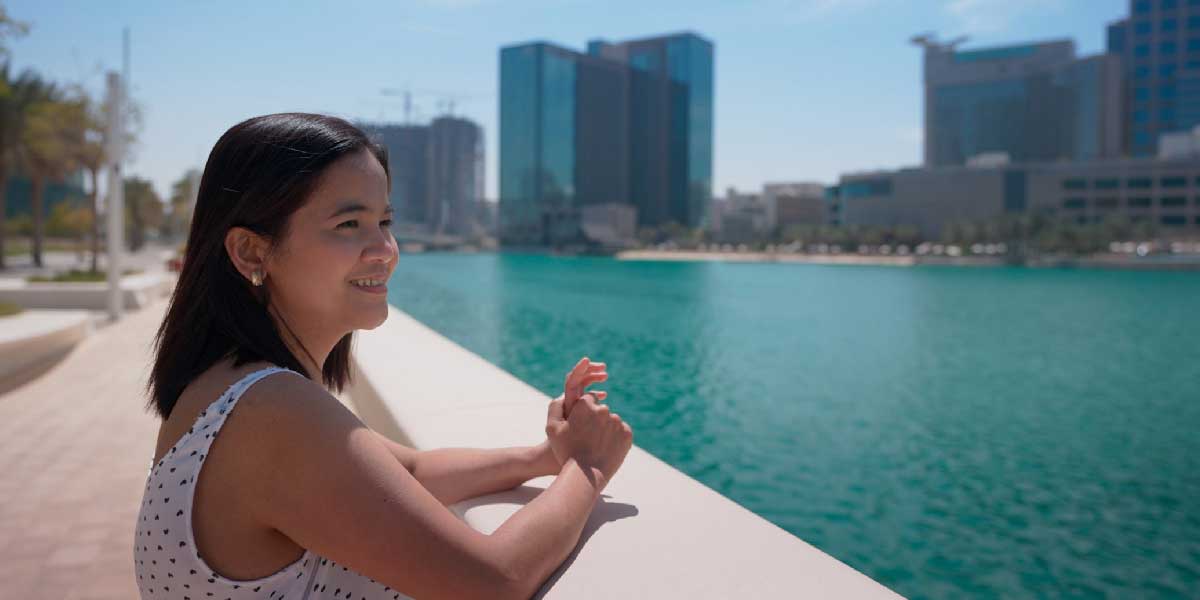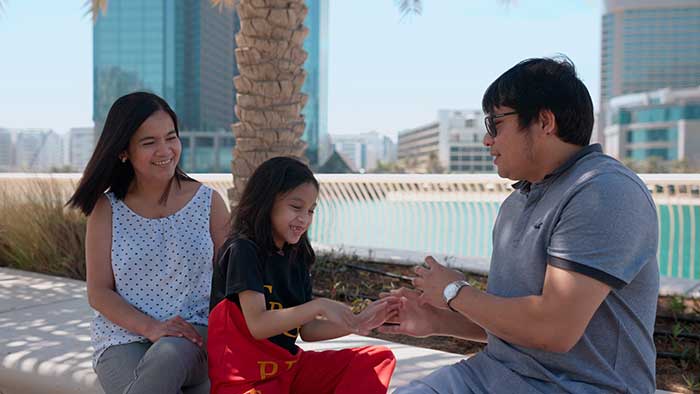
A global search for a rare blood type, international collaboration and a complex process of self-donation made a life-saving operation possible for an Abu Dhabi resident at Cleveland Clinic Abu Dhabi, an integral part of Mubadala Health.
In 2018, Daina Bautista, a working mother from the Philippines who has lived in Abu Dhabi for more than 15 years, first began to suspect something was wrong. She had been having terrible coughing fits that her family doctor first diagnosed as asthma. Follow-up scans revealed that three valves in her heart were damaged. Wary of undergoing surgery, Daina resumed her life as normal. By 2020, her conditioned had deteriorated significantly.
“At first, I was able to live my life as normal. I knew something was wrong, but I wanted to focus on my work and family. Eventually, I couldn’t walk for more than a few minutes without losing my breath and needing to rest. I was always short of breath and even everyday tasks became very hard for me. I knew it was time to go back to the doctor and finally get my heart fixed,” says Daina.

Admitted to a hospital in Abu Dhabi, Daina underwent routine pre-surgical tests the day before her scheduled operation. In the early hours of the next morning, a nurse told her the surgery wouldn’t go ahead as planned. The hospital had been unable to find a blood match for her in more than 100 samples. Given the complication, her case was transferred to Cleveland Clinic Abu Dhabi.
The Transfusion Medicine Pathology team at Cleveland Clinic Abu Dhabi performed extensive testing that revealed that in addition to Daina’s blood type being the already relatively rare B+, a group found in only about 9% of people, it also lacked the JK3 protein, an extremely rare phenotype. This meant she could only receive blood from donors who both matched her blood type and also lacked that specific protein.
“As soon as we discovered that Daina’s blood lacked the JK3 protein, something that is exceptionally rare worldwide, we began our search for donors within the UAE and abroad. For her life-saving surgery to take place, we would need at least six units of blood, a difficult feat given the rarity of this specific phenotype coupled with her uncommon blood type,” explains Dr. Manuel Algora, a clinical pathologist and director of Cleveland Clinic Abu Dhabi’s blood bank.
Dr. Algora and his team began working with Abu Dhabi Blood Bank to find suitable donors. His team also tested Daina’s relatives living in the UAE. Although they too lacked the JK3 protein, their blood types did not match hers. A compatible donor was found in Abu Dhabi and was able to donate one of the six units needed for the surgery. As blood donors can only give blood every eight weeks, Dr. Algora then widened the search, contacting blood banks across the UAE, Gulf region and as far afield as Malaysia and Spain. The search was limited by the complexity of transporting blood, it can only remain outside medical freezers for a few hours before it can no longer be used. Eventually, two units of matching blood were found in Kuwait.
While a team from Cleveland Clinic Abu Dhabi’s administration dealt with the logistics and permits required to import the blood from Kuwait, Dr. Algora and his team worked with Abu Dhabi Blood Bank to collect four units of blood from Daina herself.
“Although we had a local donor and two units coming from abroad, we still needed four more units to safely perform the surgery. Collecting that much blood from the local donor would have taken months as a person can only donate one unit every two months. However, self-donation has very different requirements. As Daina had strong hemoglobin we were able to administer treatment to boost her red blood cell production so that she could safely self-donate at a rate of once per week,” continues Dr. Algora.
Under close medical supervision by her care team at Cleveland Clinic Abu Dhabi’s Infusion Center, Daina gave four units over a three-week period so that the hospital would have enough blood to perform her surgery. The blood was collected by a team of specialists from Abu Dhabi blood bank who travelled to the hospital along with their equipment to ease the donation process and ensure her medical needs were taken into account.
“Blood is really the foundation of modern surgery. If we can’t replace the blood lost to bleeding during surgery, many of the surgeries we take for granted today simply could not happen. Even with minimally invasive surgery, it’s vital that we have blood on hand to ensure patient safety. When I heard we had the blood needed to repair Daina’s heart valves I was thrilled. We could finally move ahead and get her back to living a full life,” says Dr. Umer Darr, the heart surgeon who led Daina’s surgery.
Daina’s surgery finally took place on December 15, more than three months after it was initially scheduled. Although the search for blood had caused a significant delay, Daina made a swift recovery following her surgery and was discharged on December 31, ready to see in the New Year in good health.
“I am so grateful to Dr. Algora and Dr. Darr for everything they have done for me. Although it was stressful, I always felt safe and cared for at Cleveland Clinic Abu Dhabi. I can hardly believe the effort everyone made to find the blood I needed. It has really opened my eyes to the importance of blood donation and what a beautiful gift it represents,” concludes Daina.
Cleveland Clinic Abu Dhabi holds regular blood donation events for its caregivers in partnership with Abu Dhabi Blood Bank. With an appreciation of the importance that donated blood offers in the life-saving care offered across the UAE, the events collect hundreds of units of blood each year, supporting the operation of the entire healthcare sector in Abu Dhabi.
“This was a very difficult case and I’m very proud that we were able to come together as one team across all areas of the hospital to arrange for the import of the blood Daina so desperately needed. Fortunately, we have a fantastic relationship with Abu Dhabi Blood Bank, the Ministry of Health and Prevention, and the international blood transfusion community. When we spoke to colleagues in other countries, they understood the challenge and did everything they could to help. Without the support of our local and international partners, this could not have happened,” concludes Dr. Algora.
For more information or to book an appointment at Cleveland Clinic Abu Dhabi, call 800 8 CCAD (2223) visit www.clevelandclinicabudhabi.ae or download the Cleveland Clinic Abu Dhabi app.






















